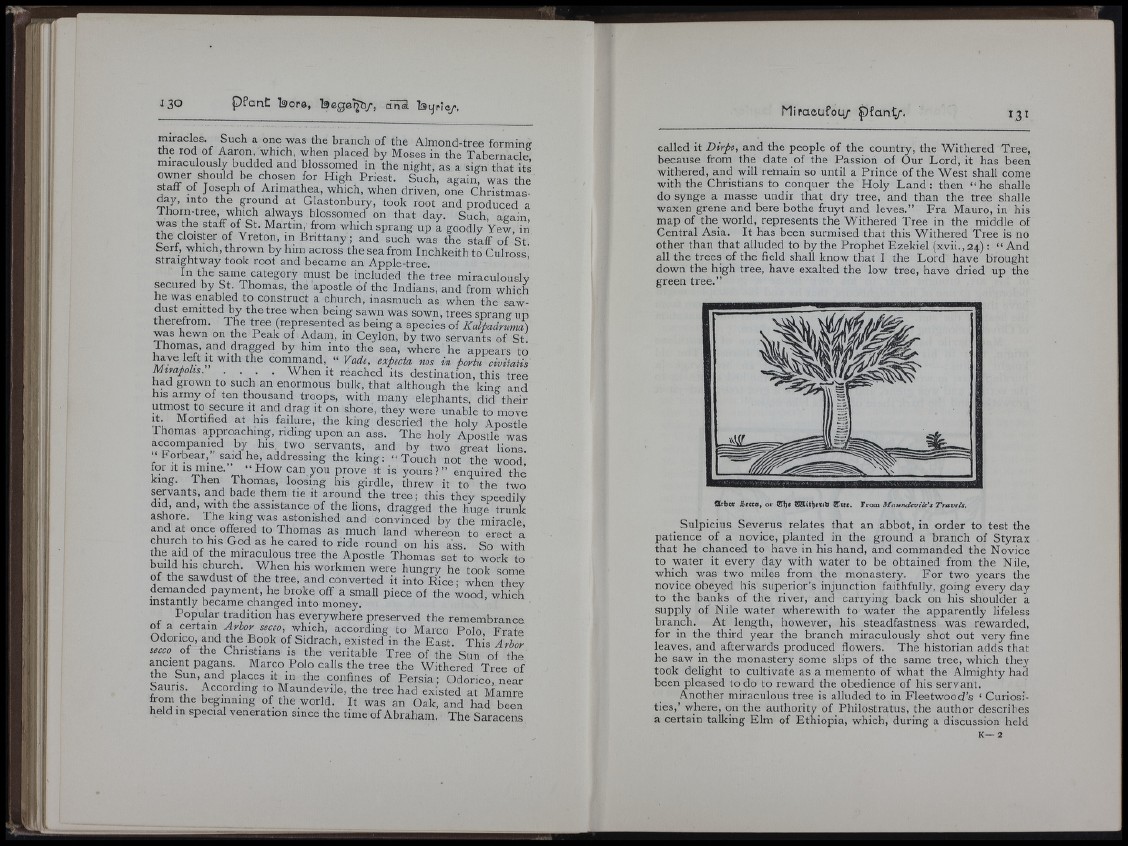
i'':;
V >IS J
i f
m ir a c lj Such a one was the branch of the Almond-tree forming
the rod of Aaron, which, when placed by Moses in the Tabernacle
miraculously budded and blossomed in the night, as a sign that its
o w j r should be chosen for High Priest. Such, again, was the
staff qi Joseph of Arimathea, which, when driven, one Christmass
y , into the ground at Glastonbury, took root and produced a
Ihorn-tree, which always blossomed on that day. Such, auain
was the staff of St. Martin, from which sprang up a goodly Yew in
toe cloister of Vreton, in Brittany; and such was the staff of St
Seri, which, thrown by him across the sea from Inchkeith to Culross
straightway took root and became an Apple-tree. ’
In the jm e category must be included the tree miracidously
jc u r e d by St. Thomas, the apostle of the Indians, and from which
he was enabled to construct a church, inasmuch as when the saw-
toist emitted by the tree when being sawn was sown, trees sprang up
ther Jrom . The tree (represented as being a species of Kalpadmma)
was hewn on the Peak of Adam, in Ceylon, by two servants of St.
Ihornas, and dragged by him into the sea, where he appears to
have left it with the command,_ “ Vade, expecta nos in portu civitatis
Mirapoks. . . . When it reached its destination, this tree
had grown to such an enormous bulk, that although the king and
his army of ten thousand troops, with many elephants, did their
shore, they were unable to move
i t Mortified at his failure, the king descried the holy Apostle
Thomas approaching, riding upon an ass. The holy Apostle was
accompanied by his. two servants, and by two ^reat lions
‘ ‘ Forbear,” saM he addressing the king: “ Touch not the wood,'
iqr It IS mine. “ How j n you prove it is yours?” enquired the
king. Then Thomas, loosing his girdle, threw it to the two
j j a n t s , and bade them tie it around the tree; this they speedily
did, and, with the assistance of the lions, dragged the huge trunk
ashore. The king was astonished and convinced by the miracle
and at once offered to Thomas as much land whereon to erect a
church to his God as he cared to ride round on his ass. So with
toe aid of the miraculous tree the Apostle Thomas set to work to
build his church. When his workmen were hungry he took some
J the jw d u s t of the tree, and converted it into R ic e ; when they
Jm a n J d payment, he broke off a small piece of the wood, which
instantly became changed into money.
Popular tradition has everywhere preserved the remembrance,
oi a certain Arbor secco, which, according to Marco Polo, Prate
Odorico, and toe Book of Sidrach, existed in the East. This Arbor
secco^ of the Christians is the veritable Tree of the Sun of the
ancient pagans. Marco Polo calls the tree the Withered Tree of
toe bun, and places it in the confines of P e r s ia ; Odorico, near
Sauris According to Maundevile, the tree had existed at Mamre
froni the beginning of the world. It was an Oak, and had been
held m special veneration since the time of Abraham. The Saracens
called it Dirpe, and the people of the country, the Withered Tree,
because from the date of the Passion of Our Lord, it has been
withered, and will remain so until a Prince of the West shall come
with the Christians to conquer the Holy L an d : then “ he shalle
do synge a masse undir that dry tree, and than the tree shalle
waxen grene and here bothe fruyt and leves.” F ra Maiiro, in his
map of the world, represents the Withered Tree in the middle of
Central Asia. It has been surmised that this Withered Tree is no
other than that alluded to by the Prophet Ezekiel (xvii., 24): “ And
all the trees of the field shall know that I the Lord have brought
down the high tree, have exalted the low tree, have dried up the
green tree.”
Srbor 5'fCCO, or ISTfjc ISSitfjmll iiTm. From Maumlevilds Travels.
Sulpiciiis Severus relates that an abbot, in order to test the
patience of a novice, planted in the ground a branch of Styrax
that he chanced to have in his hand, and commanded the Novice
to water it every day with water to be obtained from the Nile,
which was two miles from the monastery. For two years the
novice obeyed his superior’s injunction faithfully, going every day
to the banks of the river, and carrying back on his shoulder a
supply of Nile water wherewith to water the apparently lifeless
branch. At length, however, his steadfastness was rewarded,
for in the third year the branch miraculously shot out very fine
leaves, and afterwards produced fiowers. The historian adds that
he saw in the monastery some slips of the same tree, which they
took delight to cultivate as a memento of what the Almighty had
been pleased to do to reward the obedience of his servant.
Another miraculous tree is alluded to in Fleetwood’s ‘ Curiosities,’
where, on the authority of Philostratus, the author descrilies
a certain talking Elm of Ethiopia, which, during a discussion held
K— 2